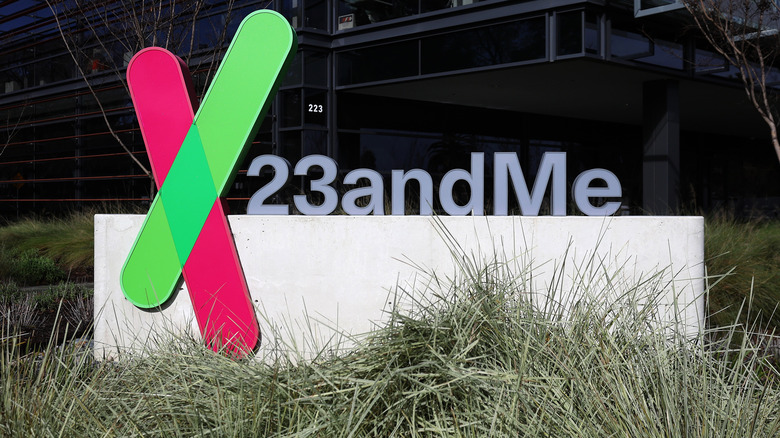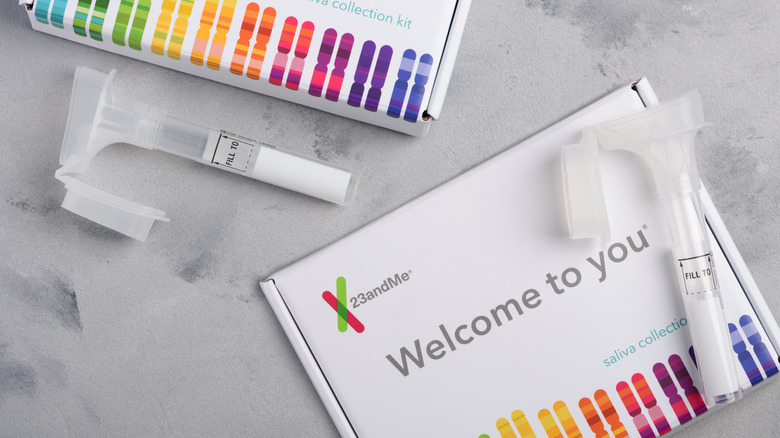A Popular Healthcare Firm Just Filed For Bankruptcy And The Reason Couldn't Be Clearer
Genetic testing company 23andMe filed for bankruptcy on March 23, 2025. The move comes after years of public mistrust, and significant legal costs stemming from a 2023 data breach involving 6.9 million 23andMe accounts, as well as the company's lack of profitability since going public in 2021.
At the time of the company's initial public offering, 23andMe hit a $6 billion market cap. Not even five years later, that market valuation has dropped to below $14 million, as of March 27, 2025. Since last March, a special committee has been evaluating how the company should move forward after years of stock free-fall and stagnant profits. The company even laid off significant numbers of staff, and is now seeking Chapter 11 protection while selling assets and looking for a buyer. With that said, there is already a buyer in the wings.
Despite already facing rejection for previous private buyout proposals — and her entire board of directors resigning in protest of the direction she wanted to take the company in last September — company co-founder Anne Wojcicki stepped down from her role as CEO at the time of the bankruptcy filing in order to position herself as an independent bidder for 23andMe. Wojcicki may still believe in 23andMe's future, but the market outlook isn't good, especially as Attorneys General all over the U.S. urge consumers to protect themselves and their data by immediately deleting their 23andMe accounts.
A flawed business model
There are many reasons companies go bankrupt, and in recent years, those reasons seem to have claimed plenty of retail and restaurant giants. Low foot traffic, lessened consumer spending, and private equity complications have sent beloved retail chains filing for bankruptcy and even bankrupted a major budget airline. Similar issues have also caused record high bankruptcies in the healthcare sector, with senior care and pharmaceutical-related businesses making up the dominant share of declarations.
23andMe's at-home DNA testing kits fall somewhere between a retail product and a healthcare optimization tool, making it prone to the bankruptcy-inducing problems occurring in both sectors. However, there's a more obvious downside to 23andMe's profitability potential, which the company has struggled with since its 2006 founding: its basic business model. While plenty of internal strife, data breaches, and matters of ethical dilemma can all be at least partially be blamed for 23andMe's slide towards bankruptcy, so can the fact that its testing kits are a one-and-done product. However initially pricey, the buy-once nature of 23andMe's at-home DNA testing kits has not added up to sustained financial success.
23andMe popularized health and ancestry-related inquiry through mailed-in saliva sample testing. While the company was revolutionary in the direct-to-consumer genetic testing space, mail-in sample tests are now the norm for a variety of companies, including subscription-based AncestryDNA from Ancestry.com, or FamilyTreeDNA, both of which (as of this writing) have not gone bankrupt.
23andMe's grim outlook
While some companies have come roaring back from bankruptcy, others often become cautionary tales instead. While Anne Wojcicki sees a positive future for 23andMe, others see a minefield. The potential for sensitive genetic data being compromised or exposed is an issue for all genetic testing companies to contend with, and one that 23andMe doesn't have the best track record of handling.
In the company's 2023 data breach, 6.9 million users — out of around 15 million total — fell victim to hackers. These hackers spent at least five months harvesting genetic information from 23andMe accounts, including predisposition information that could be used to deny insurance coverage or claims. One hacker even offered to sell this information via backchannels. The hack's targets were mainly people of Jewish and Chinese ancestry, highlighting how certain demographics may be similarly targeted in the future. 23andMe initially blamed users for the hack by implying that the use of weak or recycled passwords was to blame, and that the information accessed by hackers could not be used for harm.
23andMe eventually settled a data breach class action suit related to the hack for $30 million in 2024. In 2025, all of the data currently held by 23andMe are considered assets up for sale during the company's bankruptcy filing. Many consumers are facing a reckoning regarding what was exchanged for the cost of a trendy testing kit — causing mass user data deletions as well as a grim outlook for any sort of company comeback.


